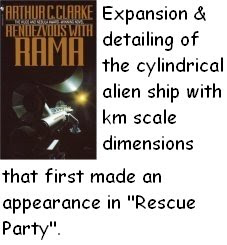"Rendezvous with Rama" (novel, hard sf): Fast paced, even with a now somewhat dated theme

While there are just too many novels now-a-days that deal with enclosed extra-terrestrial habitats, I still found it good reading because of fast pace & few pages.
And it describes a generally very realistic, if futuristic, machine. If you are an engineer, you will probably love it. Else the opinion is likely to be divided!
Story summary (spoiler).
Habitat that is the center of this story ("Rama") is an artificial world floating through space - apparently on a multi-million year journey. A huge 50 km long, 20 km wide, & 2 km thick cylinder with interior that provides breathable atmosphere, artificial gravity, sunlight & day/night cycles, artificial sea & marine life, varied landscape, wind in its various moods, & bio-robots. Plus a propulsion system that defies Newton's Third Law, & ability to fly inside the sun's corona to refuel with solar material!Story is essentially a description of the habitat details, & how it affects the human adventurers - there are few dialogs. Habitat is almost welcoming humans going by the ease with which human fliers are able to enter, explore, & sometimes defile it!
Fact sheet.
"Rendezvous with Rama", novel, reviewAuthor: Arthur C Clarke
First published: 1972
Rating: A
Hugo Award winner in novel category in 1974
Series: "Jupiter Five" (A), "Rendezvous with Rama" (A), "Rama II" (C) , "Garden of Rama" (B), "Rama Revealed" (B)
See also.
- Very good 3 minute movie showing the approach & landing of human spacecraft on Rama, & entry of human explorers through airlock into the ship.
- MP3 radio adaptation of the novel in two parts - 01, & 02.
- "Rama series summary"
- "Influences" section of "Rescue Party". A ship very similar to Rama also appears in this first published story of Clarke.
- This novel appears to be just a longer version of "Jupiter Five".
- "The Fountains of Paradise" also has a cylindrical alien robotic space probe visiting our solar system. But this cylindrical ship has dimensions in meters rather than kilometers. And is fitted with a 500 km diameter antenna for communicating back to its home world.
- "Islands in the Sky" is another Clarkian novel that devotes a very large part to description of a machine - a man-made space station in near earth orbit; but this story has far more human-interest elements compared to Rendezvous. Islands also features a space hotel that in many ways is a smaller version of Rama.
External links.
- For tastes opposite mine, see Jeff Vehige's review of Rendezvous. If you cannot stand descriptive works, you might want to go with that view.


2 comments:
the above review is typical of how poor all the reviews are on the website. at least it says a lot of things which are completely judgmental and of little value to the discusser of such literature. first of all RWR isn't "dated" it just follows a common sf theme which is a sense of wonder about an alien artifact of mysterious capacity. second clarke's plot here is to have people explore this in a way comparable to a choose your own adventure book. it deals with the physics of this made up object often. All of this is an attempt at infusing the feeling of ruins or relics into an sf setting. the result is more interesting as an aesthetic whole. he keeps us wondering what's going to happen at the end but as i remember nothing happens to conclude the book. (probably because he planned a series?)Basically it's a sense of wonder exposition story that kindof ends tailless. i feel like it would be a good painting (call me crazy) but is kindof like something's missing as a book.
In answer to comment above by hippolytus:
a. "it says a lot of things which are completely judgmental and of little value to the discusser of such literature": Actually, I consider "being judgmental" to be good attribute of a review. When I read a review, first thing I want to know is whether I should pick up this book in the first place? Reviewer passing a judgment early on helps me. I guess different people look for different things in a review.
b. I actually clarify in the main text in what sense I consider this story "dated" - there are too many stories around dealing with extra-terrestrial habitats now. Some of them might have been influenced by Clarke's stories. But when you pick up this book, the key plot element is something that doesn't quite strike as something very original - even if it might have been when the book was first published. After all, I read this book 35 years after it was published.
c. I actually didn't get too excited about "alien artifact of mysterious capacity". What I like here is a still futuristic machine, but within the capability of human engineering - except for propulsion system. I also don't see it as "ruins or relics"; building it would be an exciting project for very down to earth human engineers.
d. "probably because he planned a series?": He did not plan a series. I think he clarifies this elsewhere. That is why sequels are so different; also they are penned by Lee rather than Clarke.
Post a Comment